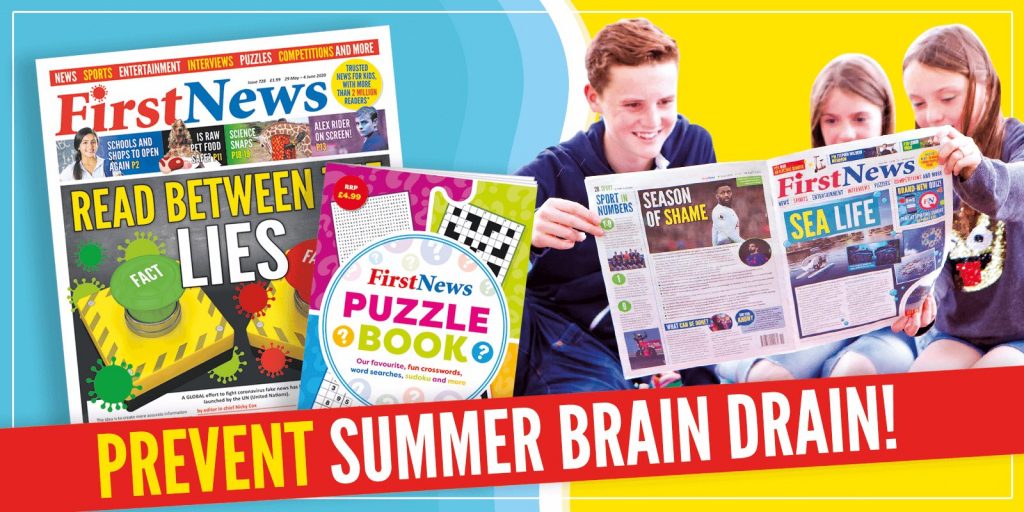
A Parent’s Comprehensive Guide for Beating the Summer Brain Drain
If you haven’t heard of ‘summer brain drain’, it’s a term for the loss experienced by children who don’t learn all summer. In the eyes of a child, summer offers an endless number of days with no school where all-night video game sessions, fort-building campouts, and chocolate-filled sleepovers seem infinite.
However, if we don’t engage our children in the right way during the summer period, they can experience ‘summer learning loss’. How do I stop summer learning loss, you ask? Harness the opportunities that summer brings to provide practical, hands-on learning that reinforces the curriculum in a fun and inspiring way.
Simple right? Of course not! That’s why we’ve put together this handy guide on how to prevent summer brain drain with some helpful summer learning tips.
What is Summer Brain Drain?
You may be asking yourself what summer brain drain is?! It may sound like a fancy American soda — in fact, it refers to the ‘slide’ that kids experience when they don’t attend school for a whole summer.
Summer brain drain occurs when children aren’t reinforcing what they have learned throughout the year. While regular school classes frequently go over past lessons, when left unpractised, these skills fade.
What’s the Consequence of Summer Learning Loss?
Summer brain drain isn’t irreparable and it isn’t life-threatening. It does, however, affect the speed at which your child returns to their school routine. With the huge disruption children have faced this year with COVID-19, a complete break from learning over the summer may reduce what they absorb when the school doors reopen in September.
However, the long summer holiday is filled with the potential for alternative learning in a hands-on environment. For children, it’s a chance to get out of the classroom (or away from the dining table) and use their hands and eyes in more intuitive and tactile ways.
Children want to have fun and don’t associate school with fun, unfortunately. This means they’ll easily get lost in video games and internet videos rather than actively choose to continue learning. While relaxing the brain is very important, it’s also wise to keep it sharp, to slide right back into learning in September.
Luckily, it’s not too difficult to incorporate fun, engaging activities into your schedule this summer without boring your child to death! If you’re asking yourself ‘How do I stop summer learning loss?’ — you’re in the right place!
Why is Summer Learning Important?
Beyond the threat of ‘brain drain’, the summer is an excellent opportunity to approach learning through a new set of media. You’ll find that children can use their senses for a whole new way of learning. Ready to run around and stretch their limbs and voices, summer learning provides the open space to explore some of their inner creativity.
As parents, our job is to channel that energy into purposeful activity to create learning opportunities. That way you can enjoy building the shed together and working out measurements in practice over the summer.
Equally, while we learn through practice — learning is a practice. In this sense, keeping the routine of learning ensures the brain stays alert and curious. This keeps the neural connections made in term-time alive and kicking.
Summer can also be a chance for new styles of learning. Perhaps your child could dedicate scheduled time to something they’ve always wanted to try, such as art, skateboarding, or learning the guitar.
Top Tips to Beat Summer Brain Drain
How do you stop summer slides?. Fortunately, it’s not such a monumental task — and one that can be enjoyed in a budget-friendly way.
Try these few helpful tips to prevent brain drain:
Get Into Nature
There’s a recent wave of research demonstrating the benefits of nature to human health. Not enough can be said for a fresh breath of air and crisp, brisk walk.
However, our busy schedules over the summer and often city-bound lifestyles make us feel far from the rolling hills. That’s not a problem — parks or anywhere with trees has been shown to be beneficial.
Walking itself helps to get the blood circulating, improving the thinking process as more oxygen can get to the brain.
Once you’re in nature, you have ample opportunity to show patterns and explore colours. You can consider the geography of the land or the history of a tree. You can point out the geometry in leaves, flower heads, and snail shells. We can use art to draw what we’ve seen, English to craft stories about it later, Maths to document the times throughout the day. We can perform a simple chemistry test on the soil to see what it’s comprised of, or we can dissect dandelions to see their biology.
Nature is the world’s biggest classroom. Use it.
Facilitate a Book Club
Some kids take to reading and others simply don’t. If you’re asking how parents can help reading at home, book clubs are a convenient start. Book clubs are a great compromise — they hang out with friends but they’re still learning.
For younger children, you may just have a reading meet-up where they choose books to read at home for which they then achieve stars/levels/points. These can be traded in for rewards. Parents can swap summer reading tips
As your children become more confident with content, you can move the book clubs toward more conversational style meet-ups about certain topics in the books or characters.
Try to keep these sessions casual and light-hearted or it will simply feel like school — both for you and them. Instead, try to let them lead the conversation. You’ll be surprised what they pick out from stories and you can use this organic movement to introduce poignant arguments they may need to know while encouraging their creative and critical thinking.
It’s vital that you incorporate some non-fiction reading into your book club. Non-fiction is a broad umbrella — you can range from football player’s autobiographies, to newspapers and magazines, to cookbooks, depending on age and skill levels. By reading non-fiction, young people learn the tone and sequence used to recall real-life events, along with more formal vocabulary and grammar. Equally, it teaches kids to be curious about the real world around them.
No parent is perfect. You can’t do it all by yourself, so try to build a community with other parents also willing to host (virtual) book club meetings. Even if it’s just once a month, you can also learn from each other’s way of teaching, gain reading tips, and the children get to mix it up.
Introduce Journalling
The benefits of journaling are well-documented, such as invoking mindfulness, increasing IQ, enhancing emotional intelligence, improving memory and focus, widening creativity, sharpening communication, and many more.
Importantly, journals can also be a way for children and adults to explore their emotions. Not only does the act of writing something down unload it from our conscience, but it also teaches us to better communicate our inner monologue, improving our communications with those around us. This is a valuable skill for children both as human beings and in terms of school work.
Simultaneously, journaling provides an opportunity to teach self-review. By providing a personal place to set goals and reflect on them, you teach this strategy for their school work and life in general.
Have your child write 3 intentions at the beginning of the week. They can decorate the page and make it personal. Try to encourage diversity, such as:
- Learn 3x Tables
- Try one new food
- Score 4 goals in football
At the end of the week, have them assess how they did. Try to dig deep into asking why they feel it turned out that way and how to improve upon this.
Leverage Technology, Don’t Fear It
While we all bask in the nostalgia of the days when kids ran the streets and didn’t need smartphones, those days are no longer here. Instead, children have a firm grasp on technology — both conceptually and literally.
The parental fear hooked on the moral panic of smartphone addiction makes us confused about the role technology is meant to play in our children’s lives. Yes, we want our children to run around, but no, we don’t want them to fall behind from their peers — technologically or socially.
Don’t panic. There are positive ways in which technology can be used to help educate your child through the summer. Just because they have their eyes on a screen, doesn’t mean fatal brain drain.
Instead, guide them toward more purposeful activity:
Find apps that support learning in an engaging and rewarding way
- Help your teenager start an online business
- Use cameras, videos, and photo-editing programs to document the summer
- Find engaging and inspiring online newspapers, like First News, to practice reading comprehension
- Take walks using Google Maps to learn about navigation
- Plan the family holiday using online scheduling tools and budgeting platforms
- Find downloadable flashcards and games
- Use the internet to undertake a research project and present it at the end of the summer
- Email penpals your children have met over the summer
Jump Down Their Rabbit Hole
Whether it’s bunny rabbits or bugs, trains or T-Rexs, electric guitars or acrylic nails, get on board.
You can’t always control what your child likes but you can leverage it for learning. It’s perhaps easier to do with smaller children – your tractor obsessed 4-year-old gets to visit the farm, work on the car engine with Dad, research tractors on the internet, read bedtime stories about tractors, write tractor stories, count tractors on their wallpaper, name the colours on tractors and so on.
For older kids, this can be a little trickier. Say your teenage son is a fan of punk. Encourage him to read autobiographies on his idols, to write songs on his guitar and share them, to write letters to venues to play gigs, to keep his record collection organised, to upscale charity shop clothes. You can teach him the history of punk music, debate the pros and cons of the political system, teach him to hang a rack for his guitar.
There are so many learning opportunities if you make it contextual and support their passions. You’ll find a much more responsive learner and you’ll build a stronger relationship together.
Teach Them to Cook
If you’re looking for everyday ideas, cooking is something that happens often more than once a day.
Cooking teaches children a wealth of important information, from nutrition to chemistry, from time management and preparation to botany and medicine. Food’s natural journey from seed to fork provides us with a golden opportunity for learning.
The basics of cooking are an integral life skill, so incorporating this as an enjoyable activity into everyday life can result in a boost of independence in your children. When preparing a meal, think about these chances to engage in learning:
- Analysing the available food
- Researching appropriate recipes
- Reading instructions
- Following instructions
- Using the appropriate equipment safely and correctly
- Time management and scheduling
- Health and safety
- Nutrition
- Artful presentation
- Cleaning up and maintaining equipment
For older kids, you can talk about the environmental effects of the food industry or link cooking to growing a garden or to start an entrepreneurial endeavour, such as a cupcake business.
Cooking and food provide a valuable lifelong skill and a great place to learn.
To Sum Up…
If you want to prevent brain drain, summer learning needs to be on the cards. While the holidays do give a chance for a looser routine, it’s important to keep your children learning to flex that brain muscle.
Incorporating exercise and hands-on learning is tremendously beneficial. You’ll find your children more engaged when learning allows them to use all their senses. Try to embed as much reading into the summer as possible, to provide topics to discuss as well as encouraging personal learning.
Remember that children are far more likely to respond positively if they’re not forced to do things they don’t care about. Try to weave educative stimuli into their interests, using their hobbies as a channel for learning rather than a road to summer brain drain.
Trusted by parents, loved by children and encouraged by teachers.
| £1.00* | Ongoing | |
| £62.99 | 26 weeks | |
| £114.99 | 52 weeks | |
| £1.00* | £26.04 | Save 100% | Ongoing | Direct Debit | |
| £62.99 | £112.84 | Save 44% | 26 weeks | One-off Payment | |
| £114.99 | £225.68 | Save 49% | 52 weeks | One-off Payment | |
* First 6 issues are £1.00. After the 6 issues trial the subscription will step up to £33.99 every 3 months. You can cancel at any time.
Every week in First News you’ll find:

20 Things To Know And Tell

Big News

Special Reports

Entertainment

Animal News

Science News

Crazy But True

Puzzles

Sport



